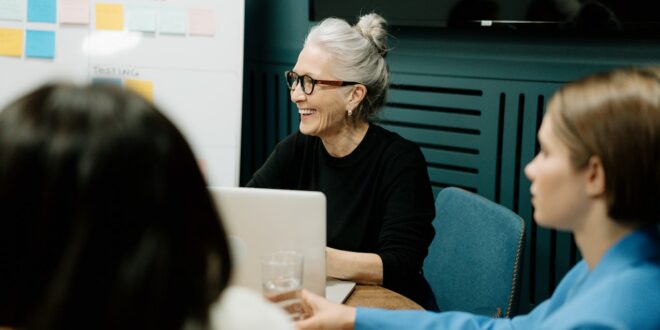By Caroline Sandford, author of Love Your Career Forever
We’ve heard the saying “the 50’s are the new 40’s”, and nothing could be more true when we consider career decision making. The concept of making one decision when starting out, then remaining in that field until retirement at 65, is no longer valid. For those starting out now, they are likely to have five significant occupational changes and 17 different jobs in their lifetime! Many of us are likely, by choice or necessity, to be in the paid workforce for many years beyond 65. The average life span is in the early eighties allowing many productive years ahead. Paid work meets many needs beyond paying the bills – staying challenged, a sense of purpose, enjoyment, social connection, and mental stimulation are just a few. There may also be a need to continue to earn for as long as is practical, and having a clear understanding of your finances will give you the reality of this. With all of this in mind, I have just published my second book, ‘Love your Career Forever – A Complete Guide for Your Career Journey’, to give you the tools to reflect on how you would like your future to look, and then put actions in place to work towards this future.
Over the last 30 odd years, there has been immense change that has impacted the way we operate. With regards to technology, in 1991 the world wide web (www) was created; in 1998 the first iMac was produced and Google went live; in 2004 Facebook, 2005 YouTube and 2006 Twitter went live and the first iPhone was produced in 2007. Today smart technology, automation, robotics, virtual reality and AI are impacting many aspects of our lives (often without us even being aware). Add to this our recent experiences of the global financial crisis, a global pandemic, earthquakes, terrorist attacks, war, floods and so forth, let alone the personal life events some will have experienced. It is a turbulent world and a different set of skills are required to successfully navigate the constant change which is often unpredictable, volatile, and uncertain. Skills include resilience, creativity, flexibility, and being able to evolve and adapt to a constantly changing world.
With continual change as a backdrop, and the notion we are most likely to remain in the paid workforce for many years, the book covers in detail what should be considered in making good decisions for the future. The first aspect is really understanding who you are, what you have to offer, what your need in the future to make it work for you, and knowing how to articulate this. Spending time reflecting on what is important to you, what interests you, your past experiences, both paid and unpaid, strengths developed, achievements demonstrated, and identifying what will support who you are, is a good place to start. Understanding what you have to offer and where you want to do this, gives you a direction for you to put your energy.
Moving into this stage of your career may also cause you to reconsider how you want this to look. Is there an opportunity to think differently about the structure of your work? Can you negotiate hours, suggest a four-day week or a nine-day fortnight? Can you change the mix of what you do to bring in more of what you enjoy? The concept of a “portfolio career” might be worth considering. This describes the idea of combining a variety of options to make up your time, such as part time, temping, self-employment, study, volunteering, mentoring, or pursuing a hobby. By rethinking working in one full time role, and instead bringing in aspects you want to be part of your life, can certainly be worth contemplating. It is also a way of building up your experience and reputation in an area of interest, that could eventually earn money, whilst being supported by regular income from part-time work.
The next aspect of redesigning your future to make it work for you is tapping into what is likely to be a strength and natural consequence of living a full life – your network. Over the many roles you have occupied, you will have built up a lot of connections. Your network is a very powerful resource when looking to change jobs, changing the structure of how you work, or wanting to research to see what possibilities are out there. The reality is many opportunities are secured through connections, and I encourage anyone to make this an important part of creating the future they want. It also means you might secure a role without putting yourself in the competitive job search process of applying for advertised roles. The book covers this in detail.
I often have clients concerned with ageism when looking at the job market. It is a valid concern as is any discrimination against aspects that have nothing with the ability to do the job. I always acknowledge this may be a very sad feature of job hunting, but encourage my clients not to make it part of their approach. Putting time into understanding what you have to offer, clarifying where you want to focus for your future, and clearly demonstrating you have what is needed to do a particular role, not only ensures you are doing the very best for yourself to get a role, but is a great way to build up your confidence.
Change can be challenging and distressing, but it can also be exciting and full of opportunity. Looking ahead and taking stock of what you would like your future to look like, identifying what needs to be in place to make it happen, and working towards creating it means you are taking control of this next part of your career journey. It is my hope you find ‘Love Your Career Forever’ a great resource to support you to do this.









Join the Discussion
Type out your comment here:
You must be logged in to post a comment.